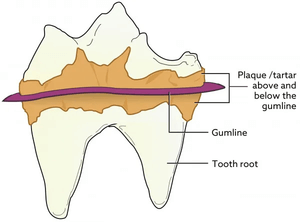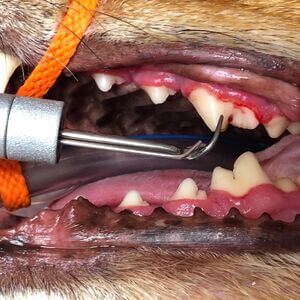After Hours
0408 512 323
Improving Dental Care for Pets: Staged Procedures
In veterinary medicine, dental disease is one of the most common and preventable conditions we see. In fact, about 80% of dogs and 70% of cats over the age of 3 have some level of dental disease. Just like with humans, proper dental care for pets is crucial to their overall health, comfort, and lifespan. Pets with healthy teeth tend to live longer, happier lives with less pain and disease.
Why Is Dental Disease Called a "Silent" Problem?

Pets often hide signs of dental pain, and by the time symptoms like bad breath or visible discomfort appear, the disease is usually advanced. When dental disease is caught early, we have more options to treat it, including non-invasive methods. Waiting too long can lead to the need for extensive oral surgery, such as tooth extractions.
During your pet’s consultation, we can identify dental issues early, before they become painful or more complicated. This allows us to start treatment when it’s most effective, preventing further damage and preserving your pet’s teeth.
Dental disease doesn’t only affect the mouth. The bacteria that live in infected gums can enter the bloodstream and spread throughout the body, potentially affecting organs and leading to further health problems. Infections of the jawbone are also possible and can be extremely painful.
What Are Staged Dental Procedures?
Staged dentistry means breaking up dental treatments into two separate phases, ensuring we can fully assess and treat your pet’s teeth in the safest and most thorough way possible.
Stage 1 focuses on a comprehensive oral exam under general anaesthesia: 
- Full-mouth dental X-rays
- Cleaning to remove plaque and tartar
- Assessment of the teeth and gums, especially the areas below the gum line
After Stage 1, we can determine whether any teeth need to be extracted.
If extractions are needed, we will schedule Stage 2 within 1-2 weeks.
Stage 2 is reserved for performing extractions or any other more invasive dental procedures, based on the findings from Stage 1.
Why Are We Staging Dental Procedures?
- My pet is eating fine—do they really need this? Pets are experts at hiding pain, and dental disease can progress quietly. Early intervention can reverse mild stages of dental disease, preventing it from becoming more serious and painful. Without early treatment, dental disease may progress to the point where tooth extractions become necessary.
- Are multiple anaesthetics safe? Yes, multiple shorter anaesthetic sessions are generally safer than one long procedure. With staged dentistry, we can limit your pet’s time under anaesthesia, improving safety and recovery.
- Will staged dentistry cost more? We’ve worked to keep costs nearly the same by subsidising the first stage. Only pets requiring extractions will move on to Stage 2, and many will only need the initial cleaning and assessment.
- What happens if I skip Stage 2? If your pet needs extractions and you choose not to proceed, they will continue to live with dental pain, and their condition may worsen. In some cases, referrals to a dental specialist may offer other treatment options, like root canals.
- Why does my pet need another dental cleaning after having one last year? Just like humans, pets need regular dental cleanings. Even with the best at-home care, plaque and tartar build up over time. Regular professional cleanings help prevent disease, reduce pain, and avoid more invasive procedures like extractions.
The Benefits of Staging
- Safer, more efficient procedures that minimise risk
- Thorough assessments with time for planning and discussion
- Lower infection risks by performing extractions in a cleaner environment
- Longer, healthier lives for your pets through early detection and intervention
If you have questions or would like to book your pet’s dental procedure, please contact us today!
We’re committed to keeping your pet healthy, happy, and pain-free.
CLICK HERE for available times and bookingsBOOK ONLINE >


